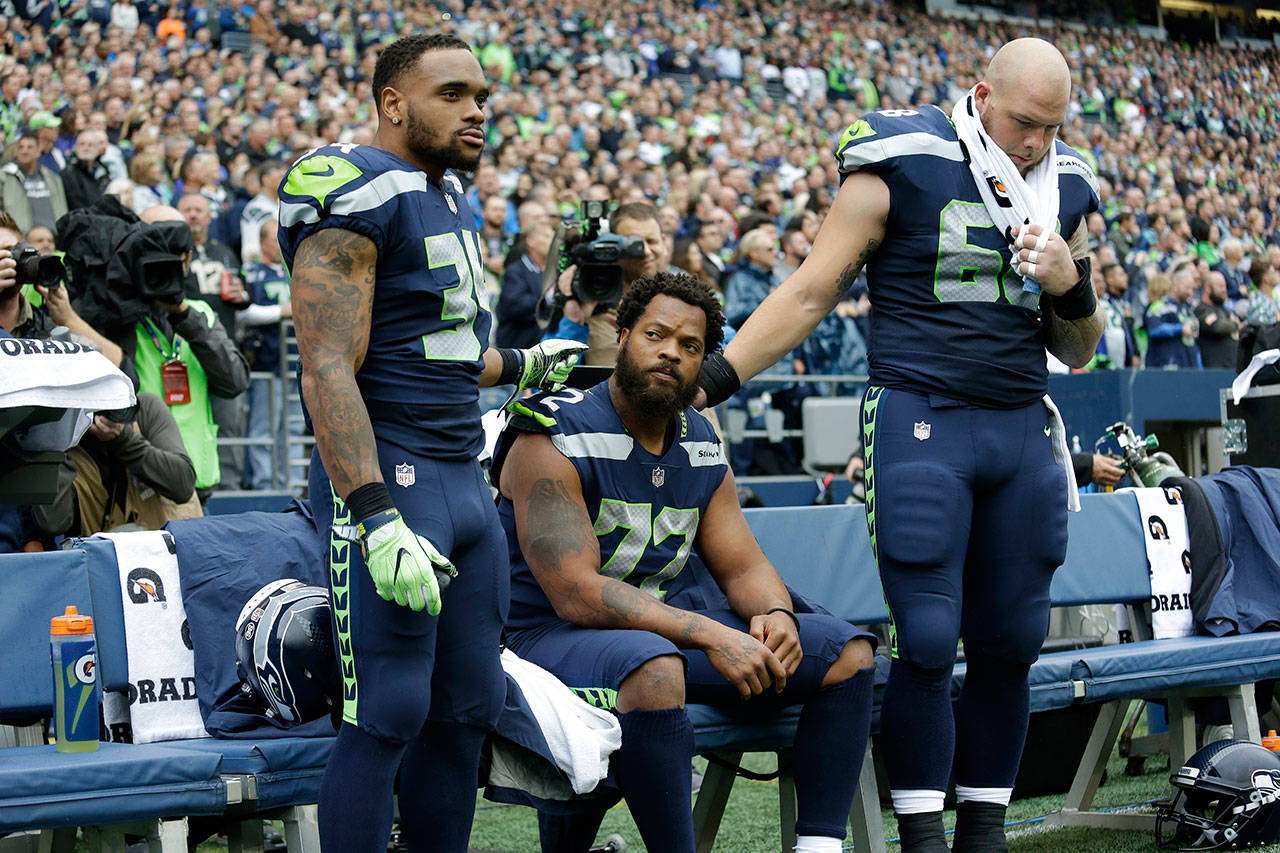By The Herald Editorial Board
If it was President Trump’s intention to discourage the protests of professional football players who during games this season have taken a knee or sat during the national anthem, his tweets and statements to supporters achieved the opposite, a response that spanned all teams playing from London to Los Angeles over the weekend.
Friday, at a rally in Alabama, Trump mused: “Wouldn’t you love to see one of these NFL owners, when somebody disrespects our flag, to say, ‘Get that son of a bitch off the field right now, out, he’s fired. He’s fired!’”
The tweets continued in a similar vein through the weekend and into Monday.
If anything, they galvanized a response from NFL players, team staff and ownership.
Many games saw players lock arms, some standing and others on one knee during the anthem. Other teams, such as the Seattle Seahawks and the Tennessee Titans, playing Sunday in Tennessee, remained in their locker rooms. In the Seahawks’ case, they did so with the endorsement of the team’s management, coaching staff and ownership.
“We fully support our players’ use of their freedom of speech and peaceful action to highlight the existing racial and other divides in our country,” read a statement from Seahawks President Peter McLoughlin, that also stressed players’ respect for the military and veterans but also the belief that issues facing the country needed to be expressed.
Legally speaking, this is an argument settled decades ago by the U.S. Supreme Court. No one can be compelled to salute the flag or say the Pledge of Allegiance, the court determined in 1943. Logic extends the same to standing for the national anthem.
“If there is any fixed star in our constitutional constellation, it is that no official, high or petty, can prescribe what shall be orthodox in politics, nationalism, religion or other matters of opinion, or force citizens to confess by word or act their faith therein,” wrote Justice Robert Jackson.
Federal appellate courts as recently as 2010, held that the inclusion of “under God” in the Pledge of Allegiance did not violate the Constitution’s Establishment Clause specifically because the choice to engage in the pledge or not to do so is entirely voluntary. Again the same holds for the anthem.
We know that many veterans and those in the military believe that they are being shown disrespect for their service as well as disrespect for the flag and the nation. But more than a few veterans have countered that argument and instead view the protests as honoring one of the things that they fought for, the First Amendment right to freedom of speech.
When then-San Francisco 49er Colin Kaepernick first began taking a knee during games last year, more than 5,500 veterans signed a petition in support of his protest. This weekend, a photo of a 97-year-old World War II veteran, John Middlemas of Missouri, taking a knee in solidarity with the players with the message, “those kids have every right to protest,” went viral on Twitter, retweeted about 130,000 times Sunday.
Certainly, the players are showing greater respect for flag and country than many of us who, even as we “stand” for the national anthem — leave ball caps on our heads, scroll through our phones, gab with friends or head for the concession stand for beer and nachos.
The players’ protests are silent and not disruptive, but provide an opening for conversation that is necessary in this country. Just as the pledge and standing for the anthem are voluntary, so is participation in that conversation. But the players have that right to open the dialogue.
Talk to us
> Give us your news tips.
> Send us a letter to the editor.
> More Herald contact information.

























